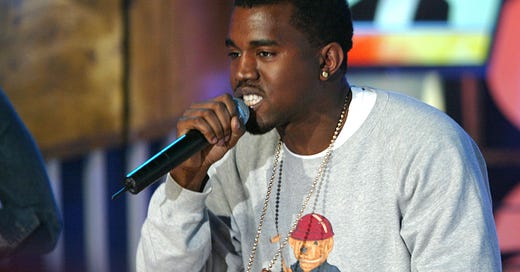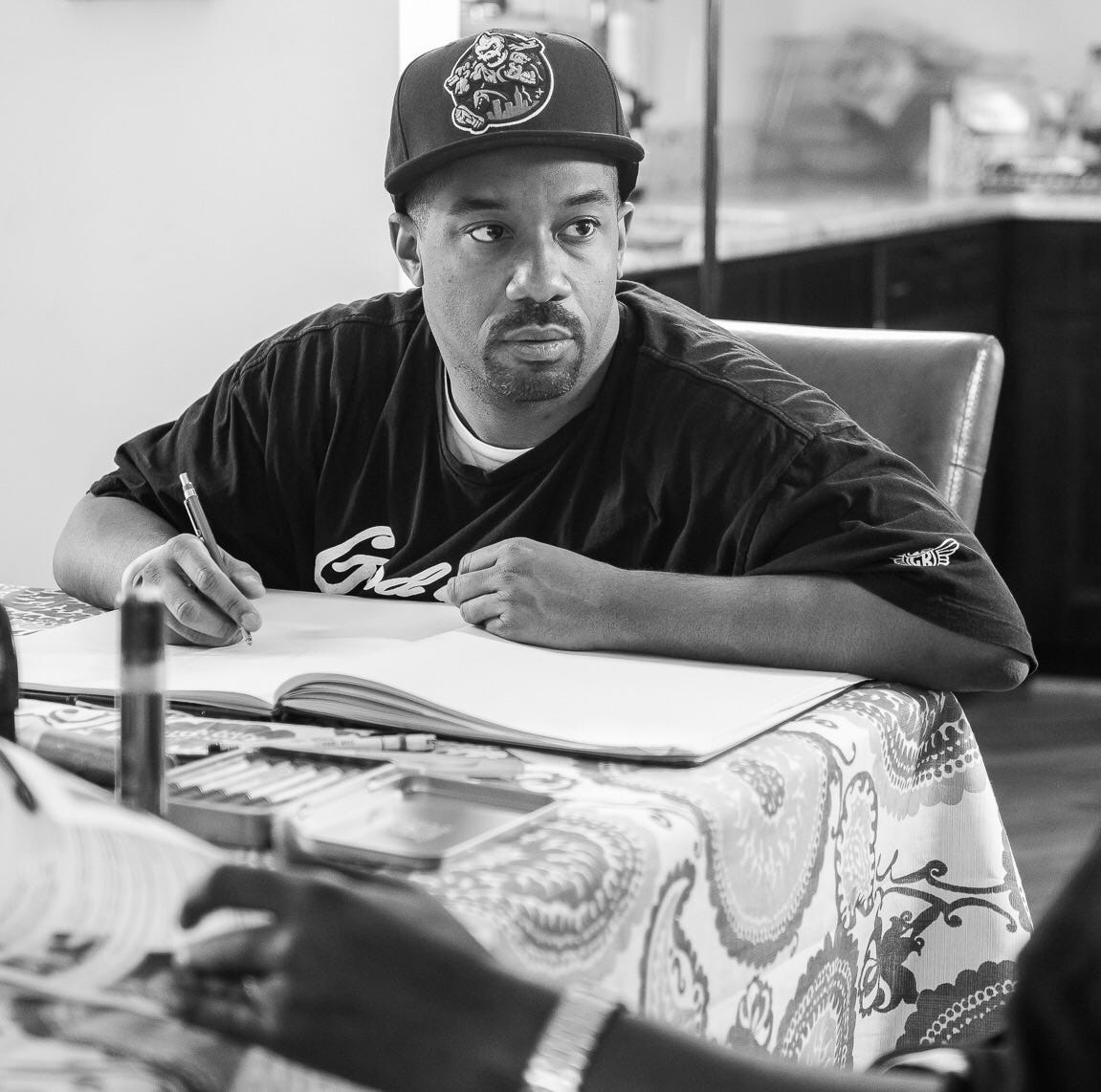I've been having trouble with writing this. As he is now, Kanye is this weird, troubling, and disappointing subject to talk about as he's gone more and more into a far-right perspective. I remember a few years ago when his current downturn began I started talking to people, co-workers, people in different places like work , film screenings etc. I spoke with younger friends about how sad and hurt this bewildering change made them. The more I heard it, the more I started to get their perspective.
Kanye was such a vital figure for many people, especially for the Millennial generation and those of the oldest Zs on music, aesthetics, and fashion. He was a landmark artist. Age-wise, he’s my peer. See, he always felt like someone who, if circumstances were different, could've been in my friend group while I was in art school in the late 90s to early 2000s. Kanye was very much an art school kid who loved hip-hop, you could see it and hear it without a doubt. It was a time of burgeoning streetwear and modern influences from around the globe. Knowing the many music labels, Japanese brands from that era, anime, and all of that was in not just my wheelhouse but also in all the people I associated with.
I hung out with many underground hip-hop folks in my time in Brooklyn, New York, and with folks crate digging and rapping each day, ending up in ciphers rhyming with people and talking about samples in hip-hop records. While I'm not a rapper, nor have I ever tried to be, it was a world I felt very comfortable in. Early Kanye or "The Old Kanye" helped me connect to that life I'd recently left by moving back home to the DMV after college.
I remember when “Through the Wire” first hit the national airwaves, outside of the mixtape world. It came out not long after Ludacris' “Stand Up,” which Kanye produced and made a cameo in the music video. Like most people, I only knew of Kanye as a new Rocafella producer. He had a few verses that honestly didn't impress me (or likely many others) but that “Through The Wire”— sheesh, what a jam! The way he sped up the Chaka Khan vocals and how his chops (edits of the samples, for those that don't know) turned that sample into a collage of itself with the drums was the perfect canvas to deliver his message of the underdog rapper making himself heard to the world.
It’s important to remember just how different Kanye was when he entered the scene back then. It’s not at all like now, with Kanye looking like some weird cosplay super-person who parades his rather young second now wife around like a living doll. Back then, Kanye was a dude from the Black lower middle class neighborhoods who wore pink polo shirts, jeans, a nice pair of tennis shoes, and a backpack.
His aesthetic was a direct contrast to the highly popular throwback jerseys, tank tops, huge, blingy chains, and the bandanas that were all the rage at the time. He wasn't from the streets, and he definitely didn't push weight. He wasn't the hyper-masculine Black "thug Superman" or Black Michael Corleone who could sell all the drugs all the time as a way of life.
I don't even need to try to go into the early backstory of early Kanye because the Jeen-Yuhs three-part documentary does that better than I can do from the perspective of people who were there the whole time. But I do remember how College Dropout felt 20 years ago— man, what a game changer. It told the story of a young person deciding to believe in himself and become a great rapper.
From the fake Bernie Mac intro through “Last Call,” Kanye essentially recalls his lead-up to this album and becoming a Rocafella artist in the post 9/11 world, which was immensely hard to make a living as an artist of any sort, he spoke to those of us like him. That story also was clearly relatable to others who didn't have creative aspirations. Track 6— “Spaceship,” featuring GLC and Consequence— spoke to anybody working a job that felt like a waste of time, something that was holding them back from their true purpose in life. The friends I was hanging out with at the time, who all worked different professions but nothing high level since we were all in our early 20s, never got sick of this song. It was so different and pushed something that was not the norm in the genre.
For me, “Jesus Walks” is one of the most shifting songs in Hip-Hop. Until that point, Rap music had two religious presences—Capitalism and Islam. Rappers wore Jesus around their necks but rarely talked openly about being Christian, outside of thanking God at award shows and Christian rap, which didn’t garner much respect from secular rappers. All that and the song slapped. As someone who’s agnostic, I was quite surprised at how much I liked the song and, honestly, how well the song did everywhere with its three different videos on the video channels.
The album had so many hits, like “Slow Jamz,” the song he made for Twista that also appeared on Twista’s own album, that also saved Jamie Foxx's recording career. With lyrics like, "She got a light-skinned friend look like Michael Jackson, got a dark-skinned friend look like Michael Jackson," it was playful, funny, and fun to repeat when listening to the song wherever you were going. “The New Workout Plan” poked fun at parts of the rap world that were visible at the time with a fun video.
Looking back, it showed the dynamic genius of Kanye who chose to have song with Jay-Z (“Never Let Me Down”) and one with Yasiin Bey (formerly Mos Def) as well, two very different Brooklyn emcees with totally different ideologies. At the time, Kanye still had a conscious viewpoint of the world that was refreshing and inspiring for those of his age and younger. All these songs together crafted such a story and a narrative that endeared him to so many and, for me, made me connect to a rapper's work in a way that at the time, I hadn't felt since De La Soul's Stakes is High. Hov was my favorite emcee at the time but I wasn't going to be a drug kingpin, and I've yet to become rich, but I do know what it’s like being an only child who goes to art school with a working mom.
Looking back, “All Falls Down” and “Last Call” are really interesting songs to to listen to because they feel the most like the core idea of what this first Kanye album is about, anchored by his observational viewpoint of his community and his infatuation with himself as the main character. “All Falls Down” has lyrics criticizing Kanye’s own generation of the Black community, including himself, while interpolating a line from Lauryn Hill's “The Mystery of Iniquity” with singer Syleena Johnson. It's something that still rings out now when you see Kanye’s public implosion and failings coming to bear, as it seems his faults and insecurities tear apart his psyche. Yet it is also a song that can bring about nostalgia for, I guess, a simpler time before iPhones, social media, and YouTube.
“Last Call,” the song that was always just okay to me, captured, in its final minutes, critical insights into Kanye’s story, as told by Kanye. Jeen-Yuhs, before Jeen-Yuhs, was THE inspirational part of the album. The film, which came out in 2022, chronicles the start of Kanye’s career through the next two decades. Coodie and Chike knew him personally, filmed many of his music videos and captured much of his career. More than any song, it was where we KNEW Kanye.
It's the one the Black community as a whole fell in love with, even with his arrogance mixed with his lack of confidence. Here was where you could understand him even more than anything else: any song, video, or poetry reading on Def Poetry Jam. The guy who wasn't "cool" by street criteria proved himself worthy and ended up just as significant as his idol at the time. That's quite rare and I don't think we'll see a story quite like it again, or even if it could happen again. I'll always remember College Dropout, where I was when I first listened, and when Old Kanye came to be.
You can check out Julian Lytle on IG at @julianlytle, his movie reviews on Rotten Tomatoes, or other things that he’s up to.







